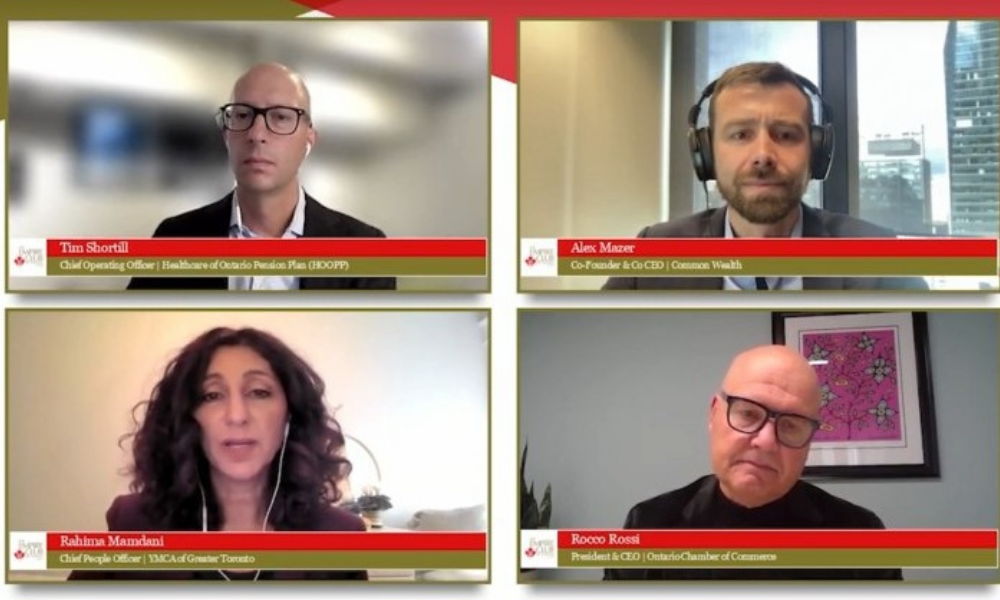'Improving your plan — whether it's by upgrading and changing your plan or changing design elements — can have a very positive benefit in terms of your human capital strategy'

Offering workers a strong retirement solution is not only a nice thing to do for the workforce, there is a strong bottom-line argument involved, according to a recent panel.
“Retirement benefits are a highly effective form of compensation that can deliver potentially up to a million dollars of value over the course of the lifetime. They’re ranked by employers as the number one or number two tool for attracting and retaining talent; they can be highly effective in reducing financial stress,” says Alex Mazer, cofounder and co-CEO at Common Wealth in Toronto, which partnered with the Healthcare of Ontario Pension Plan (HOOPP) in doing the research.
The report was compiled from a survey of 800 private sector employers and 25 interviews with employers, as well as other studies. It also found that 73 per cent of employers said financially stressed workers are less productive and 85 per cent believe pension plans are a good way to alleviate those feelings.
“Comparing against things like pay, health benefits, disability, upward mobility, and other kinds of benefits that are being discussed a lot, employers who provide these plans say they’re highly effective at accomplishing attraction and retention goals,” says Mazer.
Financial wellness is one key item that benefits both employees and employers, according to a financial expert.
However, some benefits plans should become more inclusive given today’s more diverse workplace, according to another survey.
By not providing financial security, the costs to the Canadian economy are enormous, according to Mazer, who cited recent findings by the Canadian Payroll Association (CPA) of $16 billion per year.
“Why is this? It’s because many Canadians who are financially stressed are distracted by those financial stresses during the workday and it prevents them from focusing on their work because they’re worried about paying their bills, living paycheck to paycheck or having adequate savings to be able to retire. If we can do something to reduce the financial stress, there’s a big impact on the bottom line,” says Mazer.
“Improving your plan — whether it’s by upgrading and changing your plan or changing some of the design elements — can have a very positive benefit in terms of your human capital strategy.”
Forty per cent of Canadian adults worry about the effect of COVID-19 on their savings and retirement plans, according to a separate report.
Winning the war for talent
Besides the stress factor, retirement plans can be a key tool in winning the war on talent, says an HR leader.
“We hear so much about businesses that are just not seeing as many qualified candidates, roles going unfilled and anything that can be done to make a workplace more attractive is really important in this market. And compensation is top of mind as the cost of living increases. We’ve known for some time that without retirement savings plans, a lot of Canadians don’t have enough for retirement so anything that an employer can do to support long-term-financial sustainability for people is going to be really attractive,” says Rahima Mamdani, chief people officer at the YMCA of Greater Toronto.
But this may be a challenge for smaller employers with staff who are looking for immediate gains, according to Rocco Rossi, president and CEO of the Ontario Chamber of Commerce, who also spoke on the panel.
“Their concern is the immediate expense and so the number-one issue in compensation that we get from many of our workers is just ‘Pay me the maximum today because I have today’s expenses,’” he says.
“Small businesses with limited capacity are really not in a position to be the educators on this issue.”
Almost one in five (18 per cent of) Canadians aged 50 and up are planning to push out their retirement date, according to a report from RBC. The reason? Twenty-one per cent of those with more than $100,000 in investable assets now expect to outlast their savings by 10 years, up from 16 per cent in 2010.




